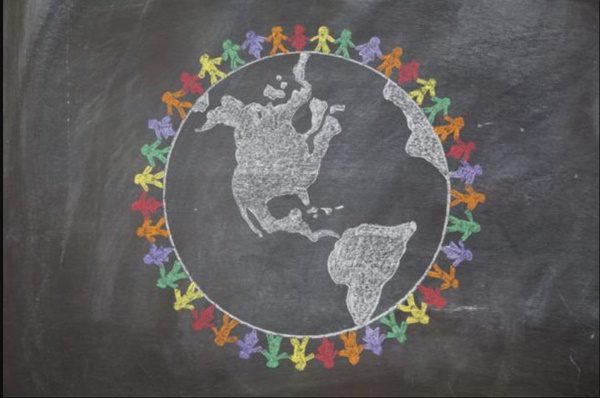 I did not march against Donald Trump.
I did not march against Donald Trump.
On Saturday, January 21st, I donned a pink hat and hopped a train to downtown Chicago, where I joined about 250,000 sisters and brothers in solidarity, love and resistance. The mood was resilient and joyful. With dear friends and beloved strangers at my side, I marched for racial, economic, and environmental justice, for interfaith understanding and immigrant rights, for the differently-abled and the LGBTQIA community.
But I did not march against Donald Trump.
I fear his policies and his bigotry. I marvel at the sheer audacity of his cabinet choices. I shudder to consider the fragility of his ego and the bullying aggression of his words, which has hurt many people and serves as a model for people to hurt others.
I realize that his vulgar personality, boasting over sexual assault, and racist and xenophobic fear-mongering have galvanized so many people in this country against him, and that personal revulsion to him propelled many people into the record-breaking crowds.
And if I’m being completely honest – ok, I did march against Donald Trump a little. The wave of anger against him sweeps me up in its current when I consider those he has personally hurt. And that anger is valid and good and necessary, because a man with a history of verbal, sexual, and financial abuse, with no sense of self-critique, empathy, or humility, does not belong in the White House.
But for me, and I suspect for many others, the people and the vision we marched for dwarf our animosity for the current head of the United States Empire. At least, I hope that is the case. Because there is a real danger in channeling all the hopeful momentum and energy of the largest march in American history in a direction of hatred against Donald Trump instead of toward constructive change. That constructive change may include impeachment, as the ability to peacefully remove our leaders is as important to democracy as the ability to peacefully elect them. But if we scapegoat him, if we focus on him as the source of our problems and his removal as our end goal, then we will still be mired in the same conditions that plagued our nation and world before he took his oath and will continue to plague us long after he is gone unless we work for comprehensive, intersectional justice.
By calling Donald Trump a scapegoat, I do not mean to imply that he is an innocent victim. But rallying over and against an individual blinds us to deeper systemic injustice and the roles we play in it, by our action and inaction. Scapegoating allows the evil of hatred to fester and grow unnoticed in our own hearts. It makes a monster out of a man (as it happens to be in this case) and strips his humanity. And it dangerously impairs our judgment, making us unable to see the good in our enemies and tempting us to align with others who may be wrong, as long as they share our hatred.
This is exactly what is happening as anger toward Donald Trump is channeled into anti-Russian hostility. Whether or not Russia hacked the DNC emails, the intelligence agencies making those assertions have not presented evidence to the public. Yet while the Trump administration promises to ramp up American aggression in order to eradicate Islamic terrorism from the face of the earth, energy that could be channeled toward nonviolent peace coalitions is funneled through hatred of Donald Trump into enmity toward Russia, and Trump’s suggestions of better relations with Russia are demonized. The ease with which anger at Donald Trump, anger for his use of scapegoating and marginalization, fed into rhetoric scapegoating Russia shows us how easily we mirror our enemies when enmity trumps compassion. (Again, this is not about what Russia did or did not do, but about how emphasis on their alleged electoral interference blinds us to our similar sins). This is just one striking example of the danger of scapegoating, keeping the war machine churning on in more ways than one.
There were marches and reasons to march long before January 20th, long before November 8th. The intertwining evils of greed, racism, dehumanization and violence have wrought devastation across the nation and the world. Wars for resources and profit drain the budget at home so that money for education, research, healthcare, housing, recreation, national parks and more are put into weapons. Drones induce terror in 8 countries and create blowback, feeding a cycle of hostility. Military equipment spills onto our streets in our police forces. School-to-prison pipelines feed cycles of poverty. A poverty draft fuels our military and keeps many of the most vulnerable among us here killing the most vulnerable over there.
The deep culture of violence in America long preceded Donald Trump. Many who marched have been battling their own marginalization and the marginalization of their communities for generations. For so many, Donald Trump has become the face of the evils festering in American culture, but he is not the root of them. Greed, exploitation, violence and enmity, spreading through America and the world like an epidemic, hurt all of humanity, destroying the soul of the oppressor as they crush the oppressed.
As we channel our collective energy, the words of the apostle Paul should challenge us, whatever faith we may claim or deny: “For our struggle is not against flesh and blood, but against the rulers, against the authorities, against the powers of this world’s darkness, and against the spiritual forces of evil in the heavenly realms.” It’s easy to channel anger against a person, a person who says or does things we find outrageous and worthy of ridicule. But we cannot ridicule greed, violence, and xenophobia, issues that transcend any face we could put upon them, issues that run deep in our culture and infect us even as we struggle against them. We can only work to transform them, by listening to each other, hearing each others’ struggles, and then organizing and mobilizing to build a nation that is inclusive, welcoming, compassionate, and willing to recognize and repair the damage of violence and privilege.
The spirit of solidarity that infused Saturday’s marches worldwide was hopeful and invigorating. But solidarity can be channeled over and against enemies, or it can be channeled toward a vision of ever-widening inclusivity that rejects the concept of enmity altogether. Such a vision is fueled by fierce love that doesn’t let injustice stand, but honors the truth that even perpetrators of injustice can be redeemed. It acknowledges that we have come and are coming together through reconciliation and mercy, and it offers to extend the same mercy and reconciliation to the people behind the oppressive systems that must be torn down. May such a fierce love guide the movement birthed in these women’s marches around the nation and around the world.
Author’s Note: As the title to this article implies, I have more to say about these marches! Stay tuned…
Image: Screenshot from Youtube: “WOMEN’S MARCH 2017 / CHICAGO / Susie’s Diary” by Susie Morales











